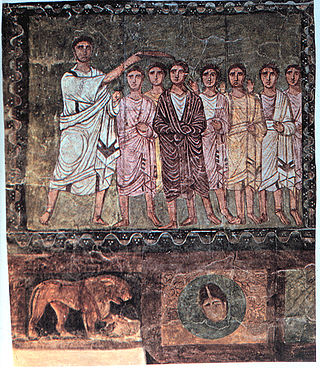
In Abrahamic religions, a messiah or messias is a saviour or liberator of a group of people. The concepts of mashiach, messianism, and of a Messianic Age originated in Judaism, and in the Hebrew Bible, in which a mashiach is a king or High Priest traditionally anointed with holy anointing oil.

Messianic Judaism is a modernist and syncretic movement of Protestant Christianity that incorporates some elements of Judaism and other Jewish traditions into evangelicalism.
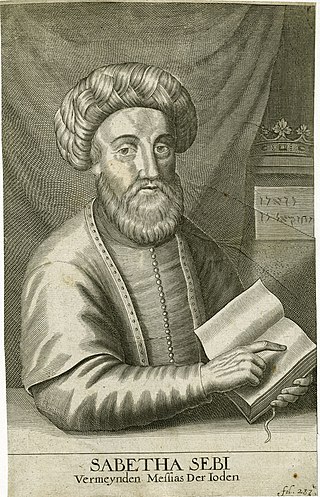
Sabbatai Zevi, also spelled Shabbetai Ẓevi, Shabbeṯāy Ṣeḇī, Shabsai Tzvi, Sabbatai Zvi, was a Jewish mystic and ordained rabbi from Smyrna. A kabbalist of Romaniote or Sephardic origin, Zevi, who was active throughout the Ottoman Empire, claimed to be the long-awaited Jewish Messiah. He was the founder of the Sabbatean movement.
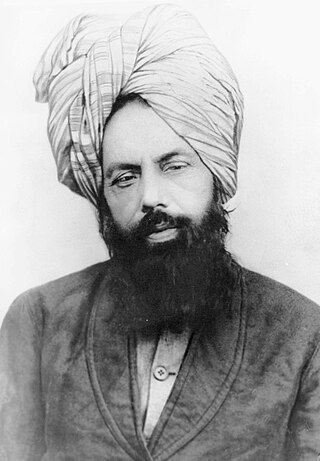
MirzāGhulām Aḥmad was an Indian religious leader and the founder of the Ahmadiyya Movement in Islam. He claimed to have been divinely appointed as the promised Messiah and Mahdī—which is the metaphorical second-coming of Jesus (mathīl-iʿIsā), in fulfillment of the Islamic prophecies regarding the end times, as well as the Mujaddid of the 14th Islamic century.

Father Divine, also known as Reverend M. J. Divine, was an American spiritual leader from about 1907 until his death in 1965. His full self-given name was Reverend Major Jealous Divine, and he was also known as "the Messenger" early in his life. He founded the International Peace Mission movement, formed its doctrine and oversaw its growth from a small and predominantly black congregation into a multiracial and international church. Due to his ideology, many consider him to be a cult leader.

William Marrion Branham was an American Christian minister and faith healer who initiated the post-World War II healing revival, and claimed to be a prophet with the anointing of Elijah, who had come to prelude Christ's second coming; some of his followers have been labeled a "doomsday cult". He is credited as "a principal architect of restorationist thought" for charismatics by some Christian historians, and has been called the "leading individual in the Second Wave of Pentecostalism." He made a lasting influence on televangelism and the modern charismatic movement, and his "stage presence remains a legend unparalleled in the history of the Charismatic movement". At the time they were held, his inter-denominational meetings were the largest religious meetings ever held in some American cities. Branham was the first American deliverance minister to successfully campaign in Europe; his ministry reached global audiences with major campaigns held in North America, Europe, Africa, and India.
Leonard Percival Howell, also known as The Gong or G.G. Maragh, was a Jamaican religious figure. According to his biographer Hélène Lee, Howell was born into an Anglican family. He was one of the first preachers of the Rastafari movement, and is known by many as The First Rasta.
Yahweh ben Yahweh was an American religious leader, black separatist and founder of the Nation of Yahweh, a new religious movement headquartered in Florida that, at its peak, had thousands of black American devotees. He preached that Jesus was black and that "white devils" temporarily rule over black people, and was accused of teaching hate. Yahweh was indicted on three counts of federal racketeering and extortion charges, of which he was found not guilty. However, he was convicted of conspiracy to commit murder.
Black Hebrew Israelites are a new religious movement claiming that African Americans are descendants of the ancient Israelites. Some sub-groups believe that Native and Latin Americans are descendants of the Israelites as well. Black Hebrew Israelites combine elements to their teaching from a wide range of sources to varying degrees. Black Hebrew Israelites incorporate certain aspects of the religious beliefs and practices of both Christianity and Judaism, though they have created their own interpretation of the Bible, and other influences include Freemasonry and New Thought, for example. Many choose to identify as Hebrew Israelites or Black Hebrews rather than Jews in order to indicate their claimed historic connections.
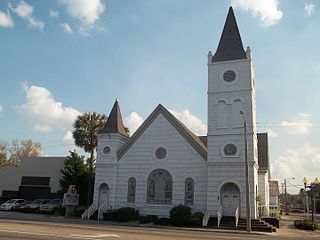
The black church is the faith and body of Christian denominations and congregations in the United States that minister predominantly to African Americans, as well as their collective traditions and members. The term "black church" can also refer to individual congregations.

Al-Masih ad-Dajjal, otherwise referred to simply as the Dajjal, is an evil figure in Islamic eschatology who will pretend to be the promised Messiah and later claim to be God, appearing before the Day of Judgment according to the Islamic eschatological narrative. The word Dajjal is not mentioned in the Quran, but he is mentioned and described in the ḥadīth literature. Like in Christianity, the Dajjal is said to emerge out in the east, although the specific location varies among the various sources. The Dajjal will imitate the miracles performed by ʿĪsā (Jesus), such as healing the sick and raising the dead, the latter done with the aid of devils (shayāṭīn). He will deceive many people, such as weavers, magicians, half-castes, and children of fornication.
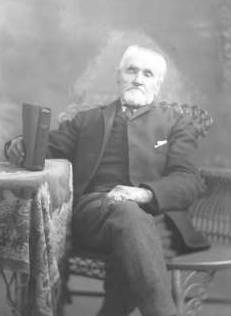
William Bickerton was a leader in the Latter Day Saint movement after the 1844 succession crisis. In 1862, Bickerton became the founding president of the church now known as The Church of Jesus Christ (Bickertonite), which is one of many churches that claim to be a continuation of the Church of Christ founded by Joseph Smith in 1830.

Riaz Ahmed Gohar Shahi is a spiritual leader and founder of the spiritual movements RAGS International and Anjuman Serfaroshan-e-Islam.

Marcelino Manuel da Graça, better known as Charles Manuel "Sweet Daddy" Grace, or Daddy Grace, was the founder and first bishop of the predominantly African-American denomination, the United House of Prayer For All People. He was a contemporary of other religious leaders such as Father Divine, Noble Drew Ali, and Ernest Holmes. Many of his followers claimed miraculous acts of faith healing while attending services and others saw his ministry as a sign from God of the imminent return of Jesus Christ.

John de Ruiter is a Canadian spiritual leader and author who conducts meetings in Edmonton, Alberta and abroad. He operates a centre called the College of Integrated Philosophy and conducted his seminars and lectures from the Oasis Centre in west Edmonton from 2007 to 2021, when it was sold to the Aga Khan Foundation for $6,650,000.
Emmanuel Odumosu known predominantly by his sobriquet Jesu Oyingbo which means “Jesus of Oyingbo” was a religious sect leader who claimed he was Jesus Christ returned. He founded the Universal College of Regeneration in Lagos. A self-proclaimed messiah, his personal beliefs included liberal sexual rights and capital accumulation. Sect members worked in various businesses of the movement establishing a self-contained economy within the movement.
Olive Tree is the most common English name of a Christian new religious movement founded in South Korea by Park Tae Son. The movement was originally known in Korea as Jesus Christ Congregation Revival Association of Korea and later as The Church of Heavenly Father. In a revised 2009 version of his 1996 doctoral dissertation on the history of Korean Pentecostalism, pastor Young Hoon Lee called the Olive Tree “the fastest growing and largest of the Korean syncretistic religions during the 1950s and 1960s,” although he noted it had become “largely insignificant” by the end of the 20th century.











